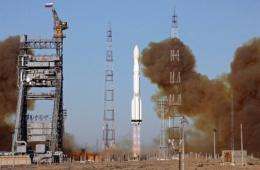Russia probes navigation system spending after crash

Russia launched a probe Tuesday into whether the money assigned to create a satellite navigation rival to the US GPS system was being wisely spent, prosecutors said, after the latest launch ended in failure.
The decision followed the failed launch Sunday of three Glonass satellites that were to have completed a satellite constellation whose development had been begun by the Soviet Union back in 1976.
Space officials said the rocket carrying the payload had failed to reach its initial low-earth orbit of 180 kilometers (112 miles). The satellites were then to have been boosted into a permanent 19,130-kilometre orbit -- but instead splashed back down into the Pacific Ocean near Hawaii.
The Russian prosecutor general's office said it was following instructions from President Dmitry Medvedev to investigating any potential misappropriation of the Glonass funds.
Investigators also said that they would announce what had caused the failure by December 20.
Initial reports put the blame on either a computer programming error or on too much fuel being put on board the Topol-M carrier.
Sunday's failure proved an embarrassing setback for a system that was meant to reestablish the country's status as a space and scientific research superpower.
Prime Minister Vladimir Putin has underscored the strategic significance of developing the Glonass system to ensure Russia's technological independence. He even fitted his dog Connie with a collar with a Glonass transmitter in a publicity stunt.
Putin said in April that Russia planned to equip all new cars sold in Russia in 2012 with Glonass readers. Those plans now appear to be on hold and there is no immediate date set for the system's deployment.
Russia planned to spend 1.7 billion rubles (55 million dollars) on the project in 2011 after spending about two billion rubles spent in 2010.
(c) 2010 AFP















